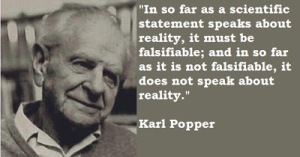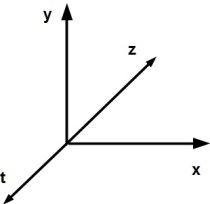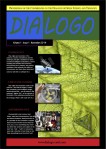There is an issue within philosophy of science that became the trigger of my interest in this discipline about two years ago. It refers to the question of the nature of the scientific growth. For centuries it was generally acknowledged and approved that the advance in scientific knowledge has a cumulative character. New data were thought to be simply added to already existent and classified knowledge in a linear and somehow predictable growth and development of various scientific disciplines. Such was the opinion of both methodologists of classical science (e.g. Herschel or Whewell), and more contemporary proponents of logical positivism, verificationism, and empiricism.
 This idea of science as a rational and critical inquiry bringing a continuous and steady growth of a publicly verifiable knowledge was radically challenged by Thomas Kuhn, a professor of philosophy of science at the University of Berkeley, whose The Structure of Scientific Revolutions is a “must-read” for every apprentice in the field of philosophy of science. Nothing further from the truth – says Kuhn – than the belief in a cumulative growth of science. He sees it rather as a cycle consistent of several crucial stages. It is true that the larger p
This idea of science as a rational and critical inquiry bringing a continuous and steady growth of a publicly verifiable knowledge was radically challenged by Thomas Kuhn, a professor of philosophy of science at the University of Berkeley, whose The Structure of Scientific Revolutions is a “must-read” for every apprentice in the field of philosophy of science. Nothing further from the truth – says Kuhn – than the belief in a cumulative growth of science. He sees it rather as a cycle consistent of several crucial stages. It is true that the larger p art of scientific activity, which he calls “normal science,” is essentially puzzle-solving activity within a certain paradigm (a bunch of basic assumptions, rules, laws, their applications, and experimental instrumentation). But there are puzzles that keep emerging on the way that may lead to a growing confusion and a situation in which the old paradigm looses its ability to solve them. This brings a scientific revolution, which institutes a new paradigm which is able to solve further puzzles. Kuhn is pretty radical in his claims. For him each scientific revolution makes scientists not only to reformulate their theories, but to change the very language they use. Scientific paradigms are radically different and incommensurable. They are like Gestalt switches.
art of scientific activity, which he calls “normal science,” is essentially puzzle-solving activity within a certain paradigm (a bunch of basic assumptions, rules, laws, their applications, and experimental instrumentation). But there are puzzles that keep emerging on the way that may lead to a growing confusion and a situation in which the old paradigm looses its ability to solve them. This brings a scientific revolution, which institutes a new paradigm which is able to solve further puzzles. Kuhn is pretty radical in his claims. For him each scientific revolution makes scientists not only to reformulate their theories, but to change the very language they use. Scientific paradigms are radically different and incommensurable. They are like Gestalt switches.

Just like you cannot see a rabbit and a duck at the same time, a scientist cannot work simultaneously within two different paradigms. Therefore, according to him, there is no linear progress or cumulative growth of scientific knowledge. The whole debate started by Kuhn raises the issues of historical and sociological aspects of science. We have to acknowledge that, being a fruit of human activity, it is not as certain and objective, as it is commonly thought.
 Kuhn’s radical ideas where widely debated. Karl Popper and his followers were not satisfied with the idea of the radical disconnection between scientific paradigms. Popper focused himself on the method of falsification, that is continuous challenging and testing of scientific hypotheses. He claimed it to be a way of approaching truth in science, in opposition to simple verification, which seems to be a never-ending quest, for each new experiment may challenge a scientific truth or law that is regarded as a valid and holding. Importantly, according to Popper, falsification needs not to assume Kuhn’s radical incommensurability of paradigms.
Kuhn’s radical ideas where widely debated. Karl Popper and his followers were not satisfied with the idea of the radical disconnection between scientific paradigms. Popper focused himself on the method of falsification, that is continuous challenging and testing of scientific hypotheses. He claimed it to be a way of approaching truth in science, in opposition to simple verification, which seems to be a never-ending quest, for each new experiment may challenge a scientific truth or law that is regarded as a valid and holding. Importantly, according to Popper, falsification needs not to assume Kuhn’s radical incommensurability of paradigms.
 Imre Lakatos proposed yet another theory which assumes that every scientific paradigm consists of a “hard core” made of laws, theories, and experimental methodologies, and a “protective belt” of auxiliary hypotheses. The latter are subject of changes, development, and reformulation, while the former is protected from any manipulations. Lakatos claims that his theory better describes the practice of science and allows for the scientific growth on the way of developing and embracing new scientific paradigms. Stability of the “hard core” provides a ground of communication between them.
Imre Lakatos proposed yet another theory which assumes that every scientific paradigm consists of a “hard core” made of laws, theories, and experimental methodologies, and a “protective belt” of auxiliary hypotheses. The latter are subject of changes, development, and reformulation, while the former is protected from any manipulations. Lakatos claims that his theory better describes the practice of science and allows for the scientific growth on the way of developing and embracing new scientific paradigms. Stability of the “hard core” provides a ground of communication between them.

It all shows the complexity of scientific endeavors, and the need of philosophical reflection concerning methodology of science. The reason I am describing all this is that I want to share a very interesting view on the nature of scientific growth proposed by Gerald Holton, and improved by William Wallace OP. Their description shows that the development of scientific theories and laws has no less than four basic dimensions that cannot be neglected.

The x-axis symbolizes the most basic, experimental or empirical component of natural sciences – a domain of an experimentalist.
The y-axis stands for the mathematical or analytical component, which is indispensable to gather, organize, and interpret scientific data – a domain of a theoretician.
The z-axis refers – according to Holton – to the thematic components of scientific discourse – a domain of a philosopher of science. This is a dimension of fundamental presuppositions, methodological judgments and decisions, philosophical convictions, ideological and even theological views. None of these – says Holton – is derived from, or resolvable into empirical observation (x-dimension), or formal analysis (y-dimension). And yet they are present and important in scientific analyses. Holton gives an example of the gravitation attraction and force. The latter is based on the principle of active potency that stands behind the whole sequence of concepts such as energeia, anima, vis, Kraft. It is from these concepts that the idea of force has developed – the idea that had taken on very different meanings for Newton, Leibniz, Herschel, Mach, and others. It shows the importance of philosophical convictions and presuppositions in science.
The t-axis – added by Wallace – refers to the development of scientific concepts in time – a domain of a historian of science.
I find the model presented by Holton and Wallace a very helpful supplement to the whole debate on the nature of scientific growth developed in the 20th century. It is a shame that the extremely high level of specialization of various scientific disciplines prevents the majority of scientists from this kind of analysis and reflection.








